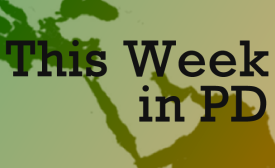Israelis and pro-Israel activities started a social media campaign on Facebook and Twitter Friday to raise awareness about the kidnappings of the three young yeshiva students who were kidnapped late Thursday night in the Gush Etzion area in the West Bank.
While the international outcry is gratifying in its endorsement of human rights and its outrage at the Islamic jihad and Sharia law, hashtag diplomacy has distinct limitations; it may serve as a starting point provided it doesn’t merely fade away after serving only to vent emotion, and it is no substitute for action.
Twitter, YouTube and Facebook are expected to be busy during the Brazil tournament, which an Adidas exec predicts will "undoubtedly be the most social World Cup ever and probably the most social event in history."
The techniques used in commercial social media campaigns don't always translate to the field of international development. Global development is a niche sector, so its communicators don't need tens of thousands of followers to be successful. Even for commercial outfits, a followership of 30,000 is not in itself an indication that the campaign is being effective: what if only 15% of those followers are from the target audience?
In an unprecedented, three-year cyber espionage campaign, Iranian hackers created false social networking accounts and a fake news website to spy on military and political leaders in the United States, Israel and other countries, a cyber intelligence firm said on Thursday. ISight Partners, which uncovered the operation, said the hackers' targets include a four-star U.S. Navy admiral, U.S. lawmakers and ambassadors, members of the U.S.-Israeli lobby, and personnel from Britain, Saudi Arabia, Syria, Iraq and Afghanistan.
Women rule social media. They dominate Facebook, Pinterest and Instagram, and stand click-to-click with men on Twitter and Tumblr. It's not all pretty pictures. This is the breakout year for hashtag activism on issues around women and girls.

As women circumvent strict censorship rules in Iran, the Qatari government looks to counter reports assailing the country's labor laws prior to the 2022 FIFA World Cup.
Police forces across Australia are acting as their own media organisations: producing video and photos, and engaging with the public via social media. However, with traditional outlets increasingly reliant on multimedia produced by the police, can the public be sure they're getting the full picture?







